|
|
|
Sort Order |
|
|
|
Items / Page
|
|
|
|
|
|
|
| Srl | Item |
| 1 |
ID:
142515
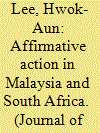

|
|
|
|
|
| Summary/Abstract |
This paper examines affirmative action in Malaysia and South Africa, two regimes that favor majorities. Malaysia’s highly centralized and discretionary programme is in contrasts with South Africa’s more democratized, decentralized and statutory structure. With regard to affirmative action outcomes, both countries have made quantitative gains in increasing representation of Bumiputeras in Malaysia and blacks in South Africa, in tertiary education and high-level occupations. However, there is also evidence to suggest continuing, primarily qualitative, shortfalls, in terms of graduate capability, dependence on public sector employment, and persistent difficulty in cultivating private enterprise. The results reported here emphasize the importance of implementing affirmative action effectively in education, while exercising restraint in employment and enterprise development.
|
|
|
|
|
|
|
|
|
|
|
|
|
|
|
|
| 2 |
ID:
148242
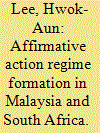

|
|
|
|
|
| Summary/Abstract |
This paper examines the formation of majority-favouring affirmative action (AA) regimes in Malaysia and South Africa. Malaysia’s Constitution premises AA on a group’s special position; South Africa’s refers to unfair discrimination. Malaysia established AA amid continuation of a political order and consolidation of executive power, while South Africa democratized and transitioned from minority to majority rule. Minority groups held less economic power in Malaysia than in South Africa. Consequently, AA in Malaysia is characterized by discretionary decision-making, and quota-based, centralized programmes, whereas South Africa has followed a legislative route involving negotiation and enforcement of target-based, statutory requirements, under less centralized oversight.
|
|
|
|
|
|
|
|
|
|
|
|
|
|
|
|
| 3 |
ID:
113858
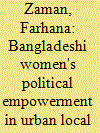

|
|
|
|
|
| Publication |
2012.
|
| Summary/Abstract |
Despite notably increased female involvement in local political bodies in Bangladesh, women continue to face multifarious problems in ongoing processes of shaping political institutions. Stereotypical gendered assumptions about divisions of labour continue to discourage such women from being present and active in the political arena. The article shows that this is not just a matter of Islamic traditionality. There are other factors at work, including lack of sensitivity to such issues among female leaders. Focusing on women ward commissioners, the study reveals specifically that they are frequently unable to show their commitment to the public as they are not assigned independent wards. When women share wards with male ward commissioners, their exposure becomes somehow insignificant to the public. Fieldwork confirms that women ward commissioners firmly believe that discriminatory attitudes of their male counterparts will continue unless they are given separate wards. This supports arguments for continued affirmative action at various levels to address gender balances in South Asian politics.
|
|
|
|
|
|
|
|
|
|
|
|
|
|
|
|
| 4 |
ID:
132533


|
|
|
|
|
| Publication |
2014.
|
| Summary/Abstract |
The rapid manner in which social protection systems have gained prominence and political support in development and poverty reduction discourse over the past few years is practically without precedent, leading some to consider it "a quiet revolution." Latin American countries have been at the forefront of this "revolution," with political support for government-funded social protection mechanisms going hand in hand with a growing discourse in favor of a human rights approach in development agendas. This approach is in line with the constitutions of most Latin American countries (including Argentina, Bolivia, Ecuador, Colombia, Guatemala, and Brazil), which enshrine a long list of human rights and explicitly recognize that these norms impose limits on state power. This constitutional protection of rights includes not only civil and political rights, but a wide range of economic, social, and cultural rights (see e.g. the constitutions of Colombia, Brazil, and Costa Rica), the prohibition of discrimination (on the grounds of gender, age, ethnicity, disability, sexual orientation, health status, and others), and the obligation to take affirmative action to protect groups that have suffered from structural discrimination (see e.g. constitution of Ecuador).
|
|
|
|
|
|
|
|
|
|
|
|
|
|
|
|
| 5 |
ID:
138496
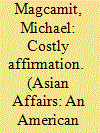

|
|
|
|
|
| Summary/Abstract |
The Barisan Nasional's construction and implementation of ideational and material security apparatuses has created a one-sided internal security dilemma in Malaysia. This paper argues that the noble objective of promoting Malay interests has been transformed to the venal objective of securing Barisan's political perpetuity that is being pursued under the pretext of achieving inter-ethnic parity within a pluralistic Malaysia. The government's quest for a bumiputra-imagined nation gave birth to affirmative action policies that have often worked at the expense of all other Malaysian ethnic groups, particularly the Chinese and Indian-Malaysians. For better or worse, Malaysia's national security is conceived and developed on the basis of bumiputra ethnicity. In other words, Malaysia's national security is designed to counter mainly the insecurities confronting the Malays, thereby generating a one-sided internal security dilemma.
|
|
|
|
|
|
|
|
|
|
|
|
|
|
|
|
| 6 |
ID:
137573


|
|
|
|
|
| Summary/Abstract |
Americans tend to think of affirmative action as a uniquely American institution: an outgrowth of the civil rights movement, intended primarily to improve economic opportunities for African Americans, who have continued to face obstacles to equality long after the Jim Crow era of segregation and overt discrimination. And it is true that as part of the Civil Rights Act of 1964, the U.S. government began to implement affirmative action policies.
|
|
|
|
|
|
|
|
|
|
|
|
|
|
|
|
| 7 |
ID:
095098


|
|
|
| 8 |
ID:
130186
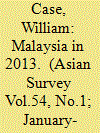

|
|
|
|
|
| Publication |
2014.
|
| Summary/Abstract |
The most important event to take place in Malaysia during 2013 was its general election. The incumbent National Front government was returned to power, though with less than a majority of the popular vote. The government then rewarded Malay supporters with new affirmative action programs. It also repulsed an armed incursion into Sabah launched from the southern Philippines.
|
|
|
|
|
|
|
|
|
|
|
|
|
|
|
|
| 9 |
ID:
184075
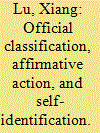

|
|
|
|
|
| Summary/Abstract |
The existing literature on the self-identity of multiethnic people focuses on Western countries where mixed identities have been normalised in census-taking. It remains unknown how multiethnic people identify themselves in countries where ethnic classification is exclusive and rigid and ethnicity is a mainly ascriptive legal category. Based on in-depth interviews with twenty Hui-Han biethnic college students in China, this article shows how official ethnic classification and affirmative action shape these people’s self-identification. Most respondents identify themselves as Hui regardless of their cultural practices, as their parents registered their official ethnicity as Hui and they have internalised this identity. The multiethnic background is more frustrating for students at China’s special ‘universities for ethnicities’ because ethnicity is a salient topic on campus and they experience more expectations to behave like Hui. Many respondents have an essentialist understanding of ethnicity and express unsupportive attitudes towards institutionalising mixed identities.
|
|
|
|
|
|
|
|
|
|
|
|
|
|
|
|
| 10 |
ID:
092393
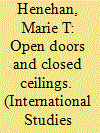

|
|
|
|
|
| Publication |
2009.
|
| Summary/Abstract |
In 1995, the Gender Research Committee of the International Studies Association conducted a survey of the membership concerning the impact of gender on members' lives. In 2006, the Women's Caucus for International Studies sponsored a follow-up survey utilizing similar questions. A comparison of the findings of the two studies shows increased representation of women within international studies, persistent frustration with the slow pace of progress in women's access to senior positions and in accommodating family issues, some evidence of a chilly climate for women and a leaky pipeline, and significant differences between men's and women's perceptions of the status of women in the profession. The 2006 survey reveals a marked increase in concerns regarding the tension between women's family responsibilities and the academic environment, identification of structural discrimination, and concerns that men have been disadvantaged by affirmative action for women.
|
|
|
|
|
|
|
|
|
|
|
|
|
|
|
|
| 11 |
ID:
117925
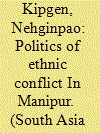

|
|
|
|
|
| Publication |
2013.
|
| Summary/Abstract |
This article analyses the conflict between the Kuki and Naga ethnic groups in the state of Manipur in North East India and attempts to understand why tensions arose in the first place and remain today between the two ethnic groups despite the formal cessation of hostilities in 1997. This ethnic conflict is shown to be a consequence of a lingering identity problem, aggravated by land disputes and equivocal responses of the state. It is argued that continued land disputes, the Nagas' unwillingness to perform Kuki customary rites and the government's indifference to the problem prevent these two groups from reaching a sustainable solution.
|
|
|
|
|
|
|
|
|
|
|
|
|
|
|
|
| 12 |
ID:
096270
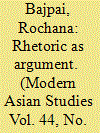

|
|
|
|
|
| Publication |
2010.
|
| Summary/Abstract |
Social justice is a key concept in the theory and practice of affirmative action. In India, social justice has come to serve as shorthand for affirmative action for disadvantaged groups, mainly lower castes. This paper provides a detailed analytical interpretation of social justice in a landmark legislative debate on quotas in India, namely the 1990 Mandal debate. It unpacks political rhetoric to reveal distinct conceptions of social justice, shows that claims for quotas for Other Backward Classes (OBCs) in the bureaucracy drew substantially on principles of social justice and democracy and argues that, despite appearances, several arguments for OBC representation in government jobs were compatible with the principle of merit. In doing so, the paper demonstrates that contrary to common opinion, political rhetoric deserves close attention. A reconstruction of political arguments over affirmative action advances understanding of some puzzling features of lower-caste politics in India. It also illuminates important questions in political theory debates on social justice.
|
|
|
|
|
|
|
|
|
|
|
|
|
|
|
|
| 13 |
ID:
093727
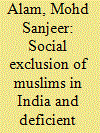

|
|
|
|
|
| Publication |
2010.
|
| Summary/Abstract |
Many nations today grapple with problems of social exclusion along ethno-religious lines and face demands for some kind of affirmative action by disadvantaged ethnic, racial and religious groups. In India, caste inequalities among Hindus have long been recognised and substantive measures for redressing disadvantages of lower castes have been in place for decades. Since India's Muslims, too, are faced with various types of social exclusion, there have been ongoing debates about the necessity of state intervention in the form of affirmative action for Muslims.
The article interrogates various strands of this debate. While relative socio-economic disadvantages among Muslims cannot be denied, how Muslims are currently presented as a marginalised and excluded community is shown to be too simplistic and actually leads to isolation. In view of the multi-dimensional nature of group disadvantage for Muslims, particularly spatial patterns observable across India, more careful understanding is needed to develop effective affirmative action policies. While deeply flawed reasoning grounds prevailing current arguments in favour of separate affirmative action for Muslims, the article suggests that the aim should be to achieve better development for all disadvantaged people from all communities in any particular space.
|
|
|
|
|
|
|
|
|
|
|
|
|
|
|
|
| 14 |
ID:
119981
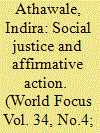

|
|
|
| 15 |
ID:
121045
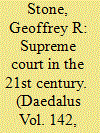

|
|
|
|
|
| Publication |
2013.
|
| Summary/Abstract |
How does the Supreme Court serve the "common good"? What is the Court's responsibility, as the ultimate interpreter of the Constitution, in our constitutional system of government? This essay explores that question with an eye on the recent performance of the Court in highly controversial and divisive cases. What explains the Court's decisions in cases involving such issues as campaign finance regulation, gun control, abortion, affirmative action, health care reform, voting rights, and even the 2000 presidential election? This essay argues that there is a right and a wrong way for the Supreme Court to interpret and apply the Constitution; and whereas the Warren Court properly understood its responsibilities, the Court in more recent decades has adopted a less legitimate and more troubling mode of constitutional interpretation.
|
|
|
|
|
|
|
|
|
|
|
|
|
|
|
|
| 16 |
ID:
146876
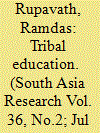

|
|
|
|
|
| Summary/Abstract |
This article critically examines initiatives for greater participation in education by tribal communities in India, arguing that current policy does not effectively enough facilitate greater participation and may, in fact, go against the avowed principle of ensuring greater equity. The article relies on fieldwork-based study to support arguments for the need to be culturally sensitive in making appropriate provisions for the education of scheduled tribes in India. Reasons for high dropout rates and non-enrolment among tribal children are examined and some searching questions are asked about why so many tribal people dislike schools.
|
|
|
|
|
|
|
|
|
|
|
|
|
|
|
|
| 17 |
ID:
084173
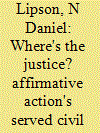

|
|
|
| 18 |
ID:
151140
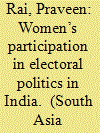

|
|
|
|
|
| Summary/Abstract |
The recent participation levels of women in formal
politics in India reveal two positives that augur well. First, the
upsurge among women voters that started in the 1990s reached the
highest female turnout ever, so far, in the 2014 Lok Sabha elections.
Second, women’s participation in high-voltage election campaigns
during the 2014 general elections also showed a substantial
increase. However, the continued under-representation of women
in legislative bodies and within the rank and file of political parties
offsets the momentous gains made in the people-driven feminisation
of electoral politics in India.
|
|
|
|
|
|
|
|
|
|
|
|
|
|
|
|
| 19 |
ID:
192299
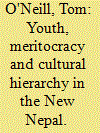

|
|
|
|
|
| Summary/Abstract |
This paper explores Nepali youth expectations about political equality in the ‘New’ Nepal following the promulgation of a constitution in 2015. It discusses the outcome of seven deliberative youth assemblies held across the country in 2018 and 2019, in which youth debated their priorities for the governments at the local, provincial, and federal levels. These assemblies revealed that youth were committed to a conception of meritocracy that prioritizes individual achievement over cultural ascription as a basis for social and economic justice. Current efforts to introduce equity through ethnic, caste, and gender reservations were seen as useful instruments to achieve this equality but also distrusted as they appeared to contradict meritocratic principles or as tactics to sustain Nepal’s existing cultural barriers.
|
|
|
|
|
|
|
|
|
|
|
|
|
|
|
|
|
|
|
|
|